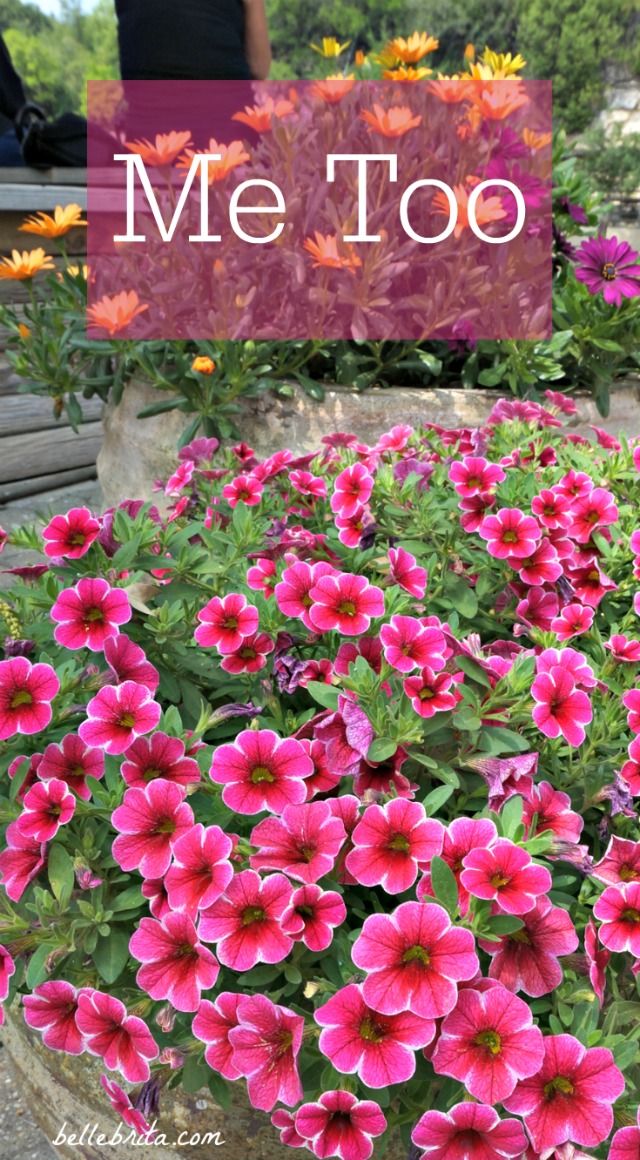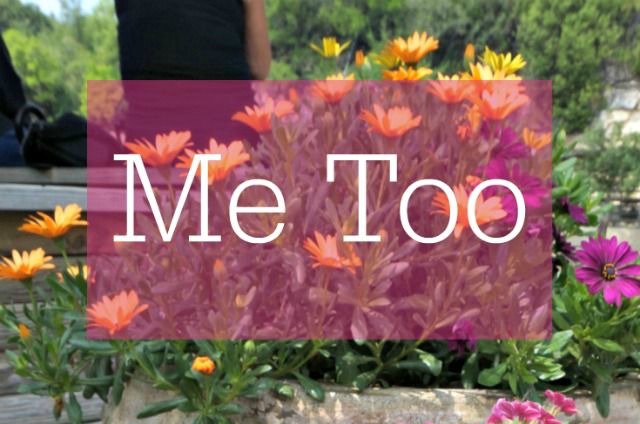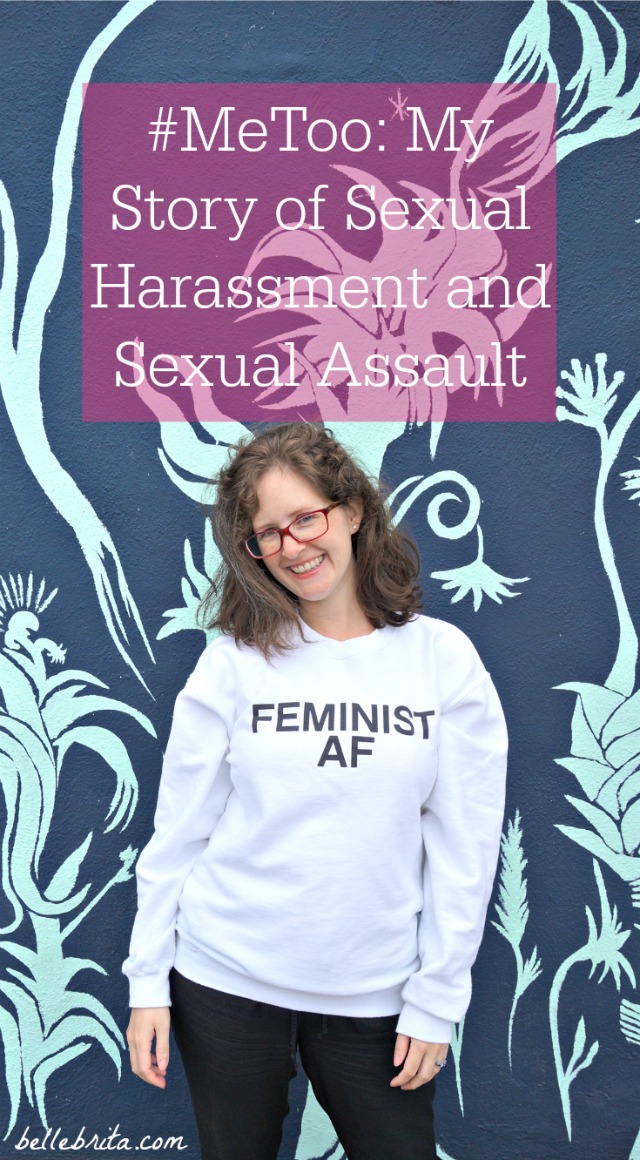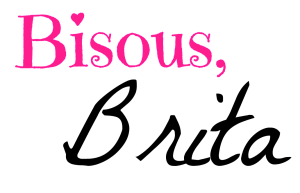
I was 12 the first time.
I was in the kitchen with two boys from school, both in my grade, although neither in my class.
I was getting a drink when I heard them walk in. I turned around and said hello. One of them leaned over and poked my breast, my beautiful, budding, barely B-cup breast that curved outward so slightly in my purple spaghetti-strap top with the embroidered butterflies.
It used to be my favorite top.
The boy poked my breast, said “Boobies!” and burst out laughing. The other boy started laughing too.
I was mortified.
Humiliated.
Ashamed.
I have no recollection of what happened next. I don’t know if I yelled, or darted out the room, or cried.
But I remember exactly how it felt for my breast to be poked against my will, for my young body to be violated. I remember exactly how the two boys looked as they laughed at me.
I remember exactly how I felt.
I felt ashamed of my poor pubescent body. I felt ashamed of how easily two boys had humiliated me, turning my own body against me. I felt ashamed for not preventing it from happening.
I blamed myself for wearing a purple spaghetti-strap top without a bra. The sight of my breasts, protruding slightly in their awkward, triangular shape–so small, and yet so precious to me–must have provoked him. The boy wouldn’t have sexually assaulted me if my body had remained childish and flat-chested.
It was my fault. My body’s fault, for its confusing forward and backward path through puberty, exasperated by prednisone to gain weight and curves, wasted by Crohn’s Disease, spiraling out of control until my body was an emaciated stick again.
When I was sick, my breasts disappeared. My body, once the cause of sexual assault, saved me from unwanted sexual attention as I lost too much weight and all the curvy hints of early womanhood.
I was 15, and 77 pounds, and scared to go back on prednisone. I knew I was sick, but at least I was safe. Boys couldn’t assault breasts that didn’t exist.
I was right to fear prednisone. I started it back up again. Slowly I gained weight. For awhile I was just thin and soft and barely curvy and still safe.
But then I turned 16. My junior and senior years of high school were wonderful and terrible as I became best friends with the women who are still my best friends, and as I settled into leadership roles that molded who I am today, and as I took classes that challenged me, and as boys began sexually harassing me.
Slut.
Whore.
Look at her breasts.
Your shirt is inappropriate.
Tits McGee.
No one wants to see your breasts.
Why do you have to display your breasts like that?
Your shirt is so slutty.
God, you’re such a bitch.
I went to Furman University, where I began the long process of reclaiming my body for myself.
My harassers stayed behind.
But when I ran into them in my hometown, the harassment continued.
Everyone look at Brita’s boobs!
Why are you dressed like that?
Slut.
Whore.
I traveled.
Three more men sexually assaulted me. I would share those stories, but I was alongside friends who were sexually assaulted by the same men. Their stories are not mine to tell.
Countless more men sexually harassed me.
It was a beautiful spring day in France after a winter bitterly cold to my southern-born body. I wore a sundress to teach my class.
After class I went to the river to read.
I wasn’t the only one enjoying the first proper spring day.
Pedestrians strolled in the sunshine.
Lovers curled up on blankets in the grass.
I found a clean spot on a low concrete wall, completely unoccupied by anyone else, and I became a vision of a woman engrossed in quiet.
Earbuds in. iPod next to me. Comfortably curled up, book in hand.
Blue skies, the sun shining brightly.
The first day warm enough to forgo long pants and a sweater.
The perfect spring day in France.
Along came a man. He sat beside me, close enough that I couldn’t extend my arm without hitting him.
An entire wall available for sitting, and he sat next to me.
He started speaking to me.
I made a great annoyed show of pausing the music on my iPod, removing a single earbud, and saying, “Quoi?” in as irritated of a voice as I could muster.
He asked me for the time.
I pulled out my cell phone, glanced at the time, and told him.
I put back my earbud, pushed play on my iPod, and resumed reading.
A few minutes later, he spoke again.
I gave every signal I didn’t want to talk. Curt responses. A made-up boyfriend.
I told him I wanted to read my book and listen to my music.
He asked me if I wanted to join him at a café. I said no.
He asked me if I wanted to get a drink with him. I said no.
He asked me if he could buy me a soda from the nearby store and bring it back to me.
I said yes.
I asked for a Coca Lite.
He walked towards the store, his back to me. I gathered my things. As soon as he was far enough away, I scurried in the opposite direction.
I was terrified he would follow me home.
I walked as fast as I could, trying not to draw attention to myself. Once I was out of sight, I slowed down, but I still walked briskly to my apartment.
In my bedroom, I closed my door. I took off my sundress and pulled on my pajamas.
It was the middle of the afternoon.
I crawled into bed. Finally, I was safe to read my book–and to cry.

My phone holds a collection of screenshots that attest to the ongoing harassment I experience online. Strange men who call me “my dear” and demand my attention and send me photos of genitalia.
I am happily married to a man who loves me, who respects me, who enthusiastically engages in consensual sexual activity with me, who never pouts or guilts me when I decline sex.
But marriage doesn’t protect me from the other men who still think they have ownership over my body and my time.
The harassment never ends.
I am 30 years old, and I am weary. I have spent half my life so far facing sexual harassment and sexual assault. I hold the stories of too many women who have also faced sexual harassment, sexual assault, attempted rape, and rape.
Me too.
Two simple words, but the untold story is devastating.
Men and nonbinary individuals are adding their voices to the cacophony of women shouting the same story we’ve repeated to infinity.
Men, do you believe us yet?
Do you give a damn yet?
Is our emotional anguish sufficient, or will you continue to doubt our stories, question our intentions, dismiss our experiences, call us liars, blame us for not speaking sooner, blame us for attracting attention, blame us for not naming our abusers?
How many women have to tag their posts #YesAllWomen and #MeToo before our collective voices will overshadow the insidious whispers of misogyny?
Our experiences may be common, but they are not normal. They are not okay.
I want to share what I wrote on Facebook last night.
The text reads:
To those who feel uncomfortable sharing, “Me too,” I see you, and I respect your need for privacy.
To those questioning if your experience was “really” sexual assault or “not that bad” compared to others–your life is valid. Your trauma is valid. Maybe it could have been worse, but that maybe doesn’t negate your painful experience.
To those who aren’t ready to relive trauma, or share a painful experience publicly, you have every right to feel that way. You do not owe the world the details of your pain.
To anyone who has experienced sexual harassment, sexual assault, attempted rape, or rape, I believe you–female, male, nonbinary, all.
I stand with you.
Me too.
There is not a right way to respond to trauma. Remember that.
It took me 13 years to tell anyone about the first time I was sexually assaulted.
It took me 8 years for me to realize what I endured in high school was, in fact, sexual harassment.
None of that negates my experiences.

Additional Reading
I’ve put together two lists of resources. The first is for survivors of sexual assault. Please seek professional help if you need it.
The second is for anyone interested in learning more about rape culture.
Resources for Survivors of Sexual Assault
RAINN: The Rape, Abuse & Incest National Network is one of the largest anti-sexual violence organizations in the country. Among their many services, RAINN provides a database of local sexual-assault service providers.
Safe Horizon: Their mission is to provide support, prevent violence, and promote justice for victims of crime and abuse, their families and communities.
Anti-Violence Project: This organization empowers LGBQT+ individuals and HIV-affected communities and allies to end all forms of violence through organizing and education, and support survivors through counseling and advocacy.
Learn More about Rape Culture and #MeToo
Feminism 101: Intimate Partner Violence
Men, you want to treat women better? Here’s a list to start with
#MeToo made the scale of sexual abuse go viral. But is it asking too much of survivors?
If you ever need someone to listen to your story, to tell you it wasn’t your fault–I am here. My inbox is always open to you.
Please share this post on social media, so more people will know they aren’t alone.
Me too.

I’m hoping the attention this issue has been getting in the last week will effect some change.
I hope so too. <3
So sorry you’ve had those terrible experiences, Brita. It’s incredible and powerful that so many people are speaking out now and taking a stand. I applaud you!
Thank you, Olivia. Everyone speaking out right now is a powerful thing indeed.
Thank you for sharing your story. This week has brought difficult memories back to the front of my mind. Me, too.
I’m so sorry, friend <3
Thank you for writing this! The other day Pearson was on his phone and said “has literally every girl I know been sexually harassed?” And I said “um, yes.” Anyway, I don’t really know where I’m going with that. But thanks for validating all types of harassment. I was in the boat of wondering if mine counts until I started seeing everyone’s stories.
Reading all the stories of sexual harassment online last week was amazing – and not in a good way. I could’ve posted #metoo, but feel that it’s not time for me to share my story just yet. I’m grateful to know the strong and confident version of Brita that you are today!